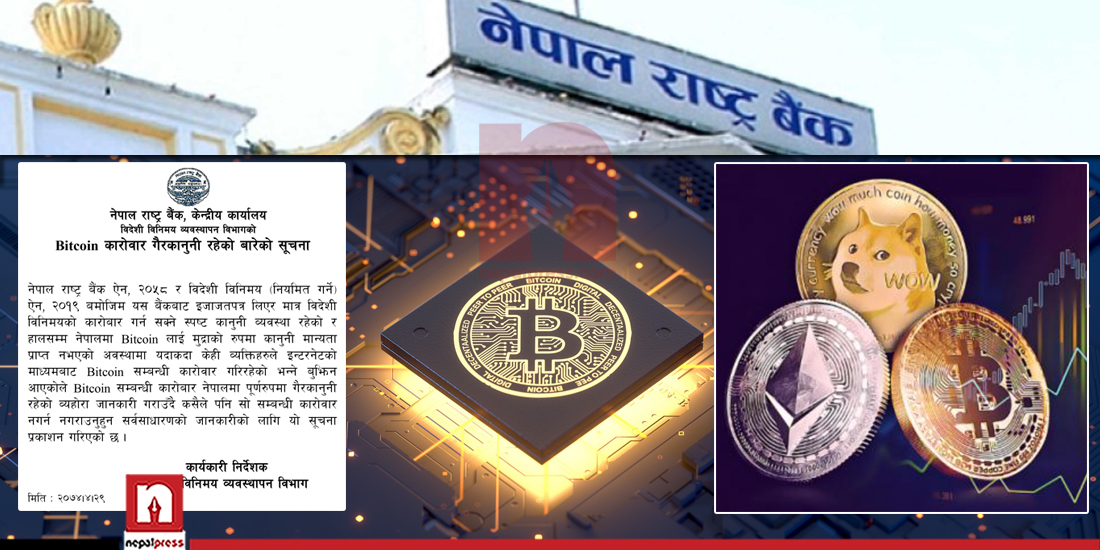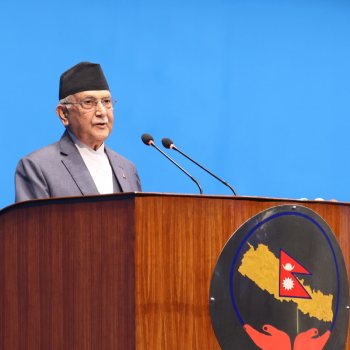The Cryptocurrency debate: Is legitimacy necessary?

KATHMANDU: The ‘decentralized electronic currency’ i.e. cryptocurrency is gaining popularity all over the world these days. Nepal’s neighbor India drafted a ‘National Strategy on Blockchain’ last January to regulate it. The law in Nepal, however, makes such currency and transactions completely illegal.
Lately, there has been a lot of debate and information about cryptocurrency on the Internet. However, correct understanding of this has not yet been formed on this in Nepal. Many have heard of Bitcoin and have an understanding on it, to an extent. However, people seem to understand that ‘cryptocurrency’ means ‘bitcoin’ and ‘bitcoin’ means ‘cryptocurrency’. Not only the general public, but the Nepal Rastra Bank also seems to have the same belief.
NRB had issued a statement on 13th August 2017 stating that ‘Bitcoin transactions are illegal in Nepal’. However, this does not say anything about other cryptocurrency coins.
Bitcoin and Cryptocurrency
According to CoinMarketCap, there are now more than 10,000 cryptocurrencies worldwide. The first of the cryptocurrencies, Bitcoin, is the most valuable and popular one. Bitcoin was created in 2009 by a Japanese programmer.
There are now thousands of cryptocurrencies like Bitcoin in the world. Other coins such as Ethereum, Polkadot, Ripple, and Dogecoin are also cryptocurrencies. However, in Nepal, the understanding that Bitcoin is the only cryptocurrency is dominant.
Lack of awareness or negligence?
Nepal Rastra Bank is the regulatory body for all economic transactions in Nepal. The statement on Bitcoin issued by the bank, which is also the guardian of banks and financial institutions, and digital service providers in the country, puts the bank’s policy capacity into question.
Nepal’s law has implemented the provision that “foreign exchange transactions can be done only with a license from Rastra Bank”. To trade cryptocurrency and invest in it, money has to be sent abroad. The statement that the NRB issued on Bitcoin, after it being declared that sending money abroad itself without approval is illegal, seems to have spread more confusion among the public. Is investing in other coins legal? This interesting question arises.
Possibility of investment
In recent times, news that people have suddenly made millions by investing in cryptocurrencies has been coming up in the international media.
Two weeks ago, news that a high-ranking employee of Gold Sachs had quit his job after earning tens of millions of dollars through DogeCoin. Similarly, the news that a 25-year-old American became a millionaire at such an early age by investing in Bitcoin also spread around the media. However, while its investment and business are spreading in Europe and United States, and even neighboring India, it is illegal in Nepal.
As cryptocurrency is not recognized as currency in Nepal, from where it is illegal to send money abroad without the approval of the central bank, at a glance, it seems impossible to invest from here. However, considering posts and statuses on social media and groups, it is apparent that a large amount is being traded invisibly from Nepal.
To some extent, Nepalis are investing by building websites, through peer-to-peer transfers, or through friends and relatives living abroad. It is being traded by people who invest in cryptocurrencies by forming groups on social networks including Facebook, WhatsApp, and Viber. However, transactions are not openly visible as it is prohibited by law.
Declaration as illegal limited to paper
It is a fact that the government has not been able to stop many economic activities that have been declared illegal by Nepal’s law. Whether it is betting, Hundi or e-commerce.
The indifference of stakeholders even in the fact that policies and decisions of the government are limited to paper and in regards to the information that comes out in pieces regarding these transactions being done invisibly is astonishing.
Last April alone, Khalti digital service provider had alerted the Rastra Bank for an investigation about the transaction statements of about a thousand users on the suspicion of being involved in betting. However, NRB has not taken any step in this regard so far, and neither has it said anything.
Similarly, even though the Hundi business of sending money from Nepal to foreign countries is illegal, it does not seem to have done anything about it. Similarly, in regards to cryptocurrency, the attitude of Nepal Rastra Bank and the government seems to be the same.
Is legitimacy necessary?
This can be seen from two perspectives. The world’s most powerful economies have legitimized cryptocurrency, claiming that it is the future of currency. In some places, cryptocurrencies are being used to pay restaurant bills, buy Netflix packages, buy Tesla cars, and even buy sports tickets.
In Nepal, where sending money abroad is a crime, its immediate legitimacy seems unimaginable. However, in the near future, if policymakers in Nepal can interpret cryptocurrency and Bitcoin differently, it may gain legitimacy.
Trading in cryptocurrencies, which seems like stock market transactions, is not as expensive as Fiat Money (rupee, dollar, euro, pound, etc.) because a third party (bank) is not required for cryptocurrency transfer like for Fiat Money. Money can be sent from any place in Nepal to any country in the world without a third party.
Blockchain technology is used to make cryptocurrency transactions possible. So no third party is required for the transaction. Due to this, its transactions are easy, safe, and quick.
How are the transactions carried out?
Cryptocurrency can be bought and sold in the same way as buying and selling shares (in the stock market) by creating a TMS account. Various platforms are used for buying and selling. For example, it can be traded by signing up on platforms including Binance, Crypto.com, Robinhood, Etoro, Coinbase.
However, you need a crypto wallet to store this. As blockchain technology is used, it is considered safe and reliable. In simpler words, transactions on the platforms can be considered like money stored in eSewa and the use of a crypto wallet can be understood as bank account deposits.











